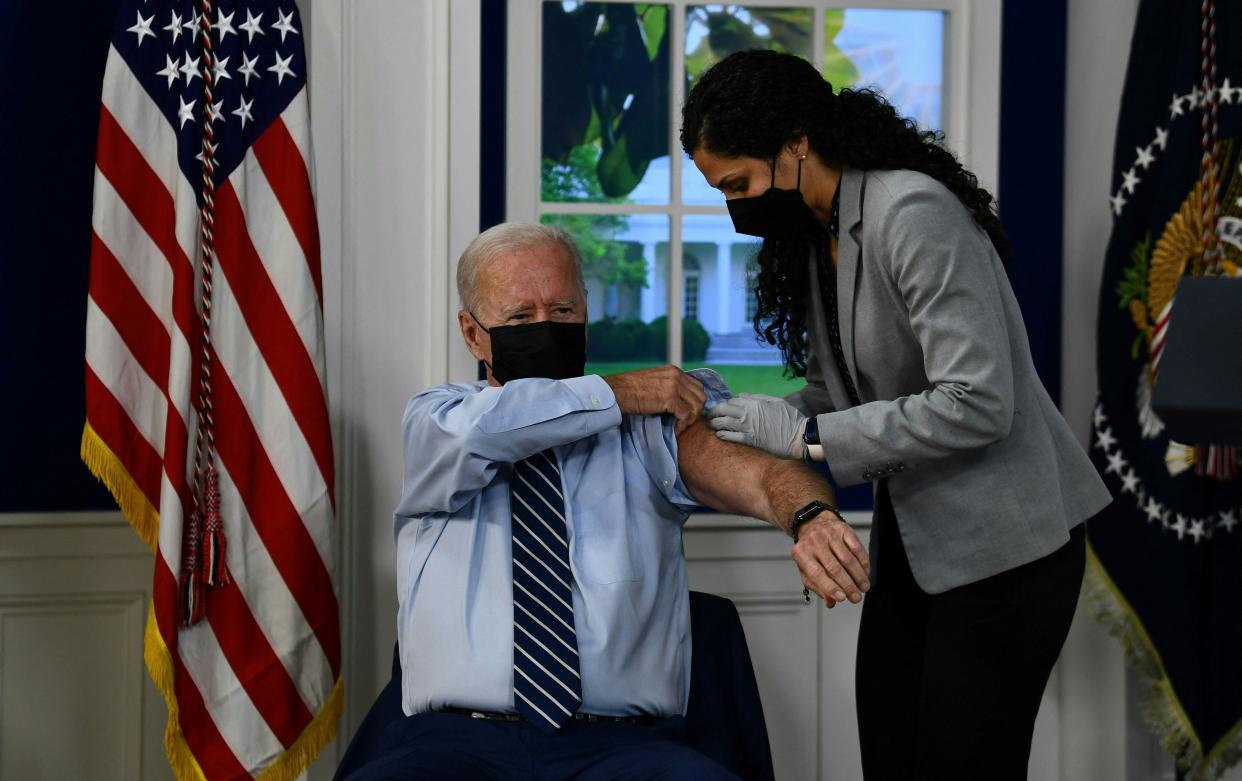Biden gets Covid-19 booster shot – here is who else now qualifies for it

- Oops!Something went wrong.Please try again later.
Joe Biden has received his Covid-19 vaccination booster live on camera at the White House.
The 78-year-old president got his third Pfizer shot and urged the 23 per cent of Americans who have not received any vaccination jab to do so.
“Like I did in my first and second Covid-19 vaccination shot, I am about to get my booster shot and do it publicly,” said Mr Biden, who explained that he was eligible to receive it because of his age.
“I know it doesn’t look like it but I am over 65 - way over - and that is why I am getting my booster shot today,” he said.
“Boosters are important but the most important thing we need to do is to get more people vaccinated. The vast majority of Americans are doing the right thing.
“But 23 per cent have not got any shots and that distinct minority is causing an awful lot of damage for the rest of the country. This is a pandemic of the unvaccinated.”
And he added: “Please do the right thing, please get the shots, it can save your life and the lives of those around you. It is easy, it is safe and it is free.”
Mr Biden, who said he had not had any side-effects from his first shots, then rolled up his shirt sleeve and got the injection.
He was then asked how many people the country needed to have vaccinated before it returned “to normal.”
“I know for certain that a quarter of the country can’t go unvaccinated and us not continue to have a problem.”
The Centers for Disease Control on Friday recommended a third shot for patients who are 65 years and older, who got the Pfizer vaccine, six months after their primary shots.
Residents in long-term care settings should also receive a Pfizer booster shot six months after their primary series.
It has also recommended that patients who are between 50 and 64 with an underlying medical condition, such as heart disease, high blood pressure, lung disease, obesity and diabetes, should also get a booster shot.
The CDC also lists conditions such as diabetes, obesity, cancer, heart failure, kidney disease, smoking, substance abuse and pregnancy.
People aged 18 to 49 who have underlying medical conditions, and people 18 to 64 at higher risk of catching Covid-19 because of where they work or live may also chose to get a booster shot.
This group includes healthcare workers, teachers, grocery store staff, day care workers, homeless shelter workers and prison staff.
A third dose of either Pfizer or Moderna has been available since August for anyone who is moderately to severely immunocompromised and received their second dose at least four weeks earlier.
This group of people includes those with weakened immune systems due to organ or stem-cell transplant or cancer treatment.
The CDC has indicated that Moderna and Johnson & Johnson booster shots will also be recommended sooner rather than later.
Moderna’s application for a third shot to follow its two-shot vaccine is currently under FDA review.
Patients do not require a doctor’s note for a booster shot. The CDC says patients just need to bring their CDC card with confirmation of Pfizer vaccination, their identification and insurance card.
The US has seen more than 42.9m cases of Covid-19, and more than 688,000 people have died during the pandemic.
